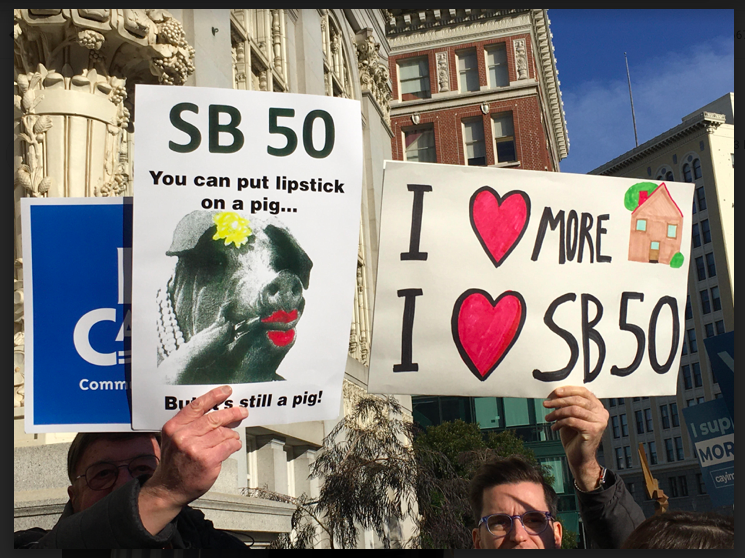Letter to city attorney seeks advice on how to deal with mandates from Sacramento that almost everyone agrees SF can never meet.
By TIM REDMOND
JANUARY 1, 2024
Supervisors Aaron Peskin and Connie Chan are asking the city attorney for advice on whether San Francisco can sue the state to block the punitive actions set in motion by Sen. Scott Wiener’s housing bills.
In a Dec. 26 letter, the supes challenge
The State’s unfair legislative mandates that are diminishing our City’s ability to build the affordable housing our residents desperately need, and eroding our ability to meet our legal obligations to Affirmatively Further Fair Housing.
The argument is politically solid: The state is threatening to take away funding for essential city services, including affordable housing, and take away almost all local land-use controls, if developers don’t build a huge amount of new market-rate housing in San Francisco—but developers aren’t building much of anything right now, and the city can’t force them to.
Sup. Aaron Peskin wants to know if SF can sue the state to stop punitive measures for mandates that are impossible.
The Planning Commission and the supes have already passed all of the “constraint reduction” bills the state asked for. That’s all they can do.
“We cannot force developers to build and yet new legislation would seek to penalize San Francisco anyway,” the letter states.
Sup. Connie Chan wants to push back on the state’s impossible rules
In fact, it notes:
70,000 units of housing are approved and ready to be built. Developers have chosen not to build. Yet the City is being penalized by allowing these same developers to essentially have peremptory powers over regular local processes.
Meanwhile, 46,000 of the new units the city is supposed to have under construction in the next six years by law have to be below-market-rate—and nobody at City Hall, including the mayor, sees any path to make that happen without state or federal funding.
Senator Wiener’s legislation, SB 828 which was signed into law in 2018, forced cities to rezone land and resulted in an explosion of San Francisco’s RHNA goals, 57% of which are made up of the three below market rate categories, with no additional State funding. This sets San Francisco up to underperform in all four RHNA categories. Not only has Senator Wiener set up San Francisco to fail, despite all our legislative and funding efforts, he added a last minute amendment to SB 423 that singles out San Francisco for streamlining in 2024, which is years earlier than every other jurisdiction in California. As a result, San Francisco is forced to approve unaffordable market rate housing developments across the City without any public input, well ahead of any other jurisdiction in the State. Instead, what we need from the State is a major investment in affordable housing.
It concludes:
We believe that SB 423 discriminates against San Francisco, contravening our status as a Charter City, diminishes our ability to build the affordable housing our residents desperately need, and thwarts our legal obligations to Affirmatively Further Fair Housing. This new law will create undue hardship on San Francisco and ultimately lead to displacement of small businesses, residential tenants, and homeowners in San Francisco. We respectfully ask that you present the Board of Supervisors with our legal options, including but not limited to litigation against the State.
Wiener told the Examiner that market-rate housing has to be central to the solution:
“Anyone who tells you that we can subsidize our way out of this disaster also has a bridge to sell you,” Wiener said. “The argument that we should only be building subsidized housing is an argument for a perpetual, severe housing shortage.”
Peskin told me that’s an argument “from a senator who hates his own Senate district.” The city has already approved 70,000 units of market-rate housing, and has cleared the way for a lot more. It’s the state Regional Housing Needs Assessment, not the Board of Supes, that insists that San Francisco needs 46,000 new units of affordable housing.
And yet nothing in any of Wiener’s bills provides a dime for new affordable housing.
Here’s the problem: Peskin and Chan can ask for advice, but San Francisco’s city attorney is an independently elected officer, and the supes alone can’t force him to sue anyone. It’s not entirely clear under the City Charter whether even the supes and the mayor together can direct Chiu to take legal action.
Chiu is a longtime Wiener ally and a friend of the Yimbys. The odds that he would challenge SB 432 are pretty low.
The supes could seek to hire outside counsel for the case—but again, under the charter, the city attorney would have to approve that.
Could a San Francisco citizen, or organization, sue? “That,” said Peskin, “is a very good question.”
Tim Redmond has been a political and investigative reporter in San Francisco for more than 30 years. He spent much of that time as executive editor of the Bay Guardian. He is the founder of 48hills.
Letter to the editor: Yes, a taxpayer can sue over the state’s housing laws
Retired real estate lawyer weighs in on state law.
By TIM REDMOND
JANUARY 2, 2024
We love letters to the editor. Here’s one from someone who actually knows the answer to a question I raised:
In “Peskin, Chan want to know if SF can sue the state over impossible housing rules,” Tim Redmond asks, “Could a San Francisco citizen, or organization [as distinguished from San Francisco itself], sue? ‘That,’ said Peskin, ‘is a very good question.’”
The answer is that any citizen who has paid taxes to the state can sue the state (or an agency thereof) to restrain illegal, injurious, or wasteful expenditures under section 526a of the Code of Civil Procedure. Any such lawsuit needs to be brought in state court because federal courts have strict standing requirements.

Anti-displacement activists opposed one of Wiener’s bills mandating more luxury housing in San Francisco
The portion of SB 423 singling out San Francisco is illegal because it violates the California Constitution, Article IV, Section 16(b): “A local or special statute is invalid in any case if a general statute can be made applicable.” A taxpayer action could seek a declaration that this portion of SB 423 is an invalid special statute. Notably, there isn’t even language in the bill, as there is in other special statutes, purporting to justify it as addressing a problem unique to San Francisco.
A taxpayer action could also seek a broader declaration that the state housing laws do not take precedence over San Francisco zoning laws, because as a charter city, San Francisco has a right to home rule protected by the California Constitution. This power includes zoning. A conflicting state law, even on a matter of statewide concern, only prevails over home rule if the law is reasonably related to resolution of a matter of statewide concern and narrowly tailored to avoid unnecessary interference in local governance.
The state housing laws fail this test for numerous reasons. Studies by the Terner Center show the laws have failed to achieve their goals and scholars have described them as “ad hoc and not model based.”
Nick Waranoff Nick Waranoff is a retired real estate lawyer.



